PLEASE NOTE:
While the following article relates to your Google search, the services and methods at Goodwin Hypnosis may differ from those mentioned below. Since 2007, we have helped thousands of clients to overcome emotional and behavioral challenges when all else had failed. According to many of them (and their referring healthcare providers), our methods are faster than talk therapy, easier than willpower, and safer than medication. If you’re ready to resolve your issues, skip the article and visit the rest of our website, where you can learn about our unique approach, watch client testimonial videos, and discover how working with us one-on-one could be the solution you’ve been searching for.
Introduction
Fear of abandonment is a deeply-rooted emotional experience that can shape a person's relationships and overall well-being. This pervasive fear often stems from early life experiences such as loss, rejection, or emotional neglect, and can manifest in behaviors that complicate current relationships. Whether through anxious attachment, heightened sensitivity to rejection, or an overwhelming need for reassurance, the fear of being abandoned can lead to significant anxiety and distress.
Understanding the origins and symptoms of this fear is crucial in developing effective strategies for managing and overcoming it, thereby fostering healthier, more fulfilling connections. This article delves into the various aspects of fear of abandonment, including its causes, symptoms, long-term effects, and practical steps for healing and coping, offering a compassionate guide for those seeking resolution and emotional growth.
What is Fear of Abandonment?
Fear of abandonment is a profound emotional response that can manifest in numerous ways, leading to significant anxiety and distress. This fear often originates from past experiences of loss, rejection, or emotional neglect, causing individuals to become hyper-vigilant about their connections. It may not always be rational but is deeply felt, driving behaviors that can complicate connections with others.
For instance, women who lost a parent early in life may experience higher levels of anxious attachment and separation anxiety in their adult connections. A study published in Stress and Health found that these women reported more distress when separated from their partners, especially in the initial years of their connections. This increased anxiety can result in actions focused on evading perceived dangers of being left behind, which can put additional pressure on the connection.
Another example is seen in survivors of abusive relationships. The intricate interactions of authority and dominance in these circumstances render it extremely difficult for people to depart, resulting in a profound anxiety of being left behind. When survivors do manage to leave, the fear of retaliation and the lack of a support network can make them feel isolated and abandoned, further entrenching this fear.
Additionally, individuals with rejection sensitivity experience a similar struggle. They deeply desire intimate connections but are constantly on the lookout for any sign of rejection, often perceiving normal relationship dynamics as threats. This sensitivity can lead to pushing potential partners away, ironically creating the very scenario they dread.
Comprehending the origins of the anxiety of being left behind and identifying its expressions can assist in creating approaches to handle and conquer it. Self-reflection and emotional self-discovery are crucial steps in this journey, as emphasized by experts who recommend journaling and seeking support from trusted friends or therapists. By gradually tuning into their emotions, individuals can begin to unravel the layers of their internal world and foster more meaningful connections.
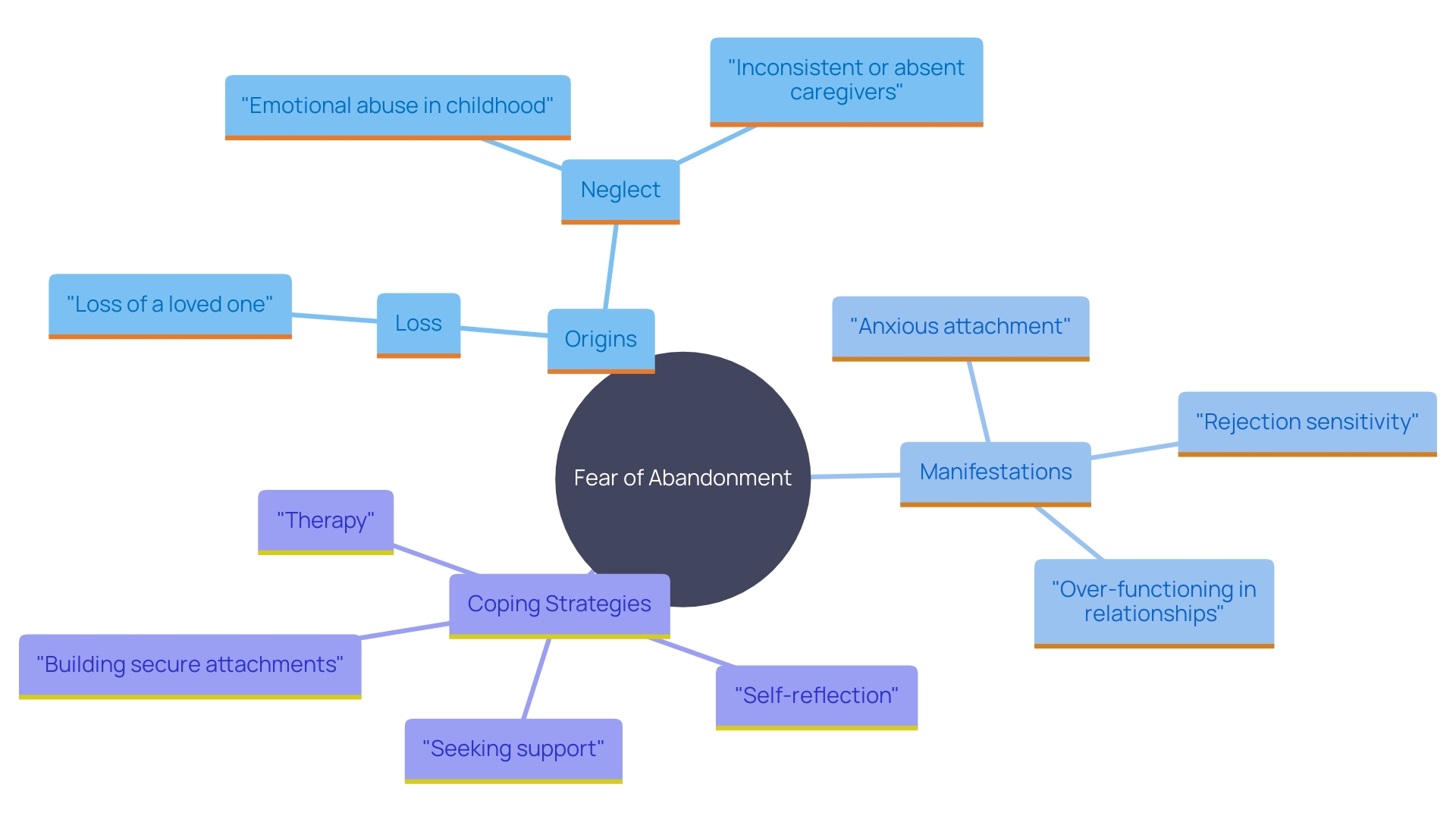
Causes of Fear of Abandonment
The anxiety of abandonment often finds its origins in early childhood experiences. Events such as parental divorce, the death of a loved one, or inconsistent caregiving can leave a lasting impact. Attachment trauma, where a parent fails to meet the emotional and physical needs of their child consistently, can manifest as neglect, abuse, or emotional unavailability. These early experiences influence our capacity to establish secure connections later in life.
According to John Bowlby's Attachment Theory, the bonds formed with primary caregivers are crucial for emotional and psychological development. Secure attachments, where caregivers are consistently responsive, foster a sense of safety and security. In contrast, inconsistent caregiving can lead to anxious attachment, characterized by a pervasive fear of being left alone or unloved.
Research has indicated that women who lost a parent early in life are more likely to experience separation anxiety and anxious attachment in romantic connections. This type of attachment peaks in the initial years of a connection and gradually declines over time. Likewise, the lack of a supportive parental figure can result in challenges in adult connections, as illustrated by Jackie, a 35-year-old attorney who faced emotions of being unloved after uncovering her partner's betrayal.
Dr. Lyons highlights that family history can leave a lasting impact on a person. Growing up with a harmful parent or experiencing the loss of a family member can lay the foundation for commitment issues and apprehension towards intimacy. These early adversities not only shape our emotional responses but also influence our coping mechanisms and social interaction patterns throughout life.
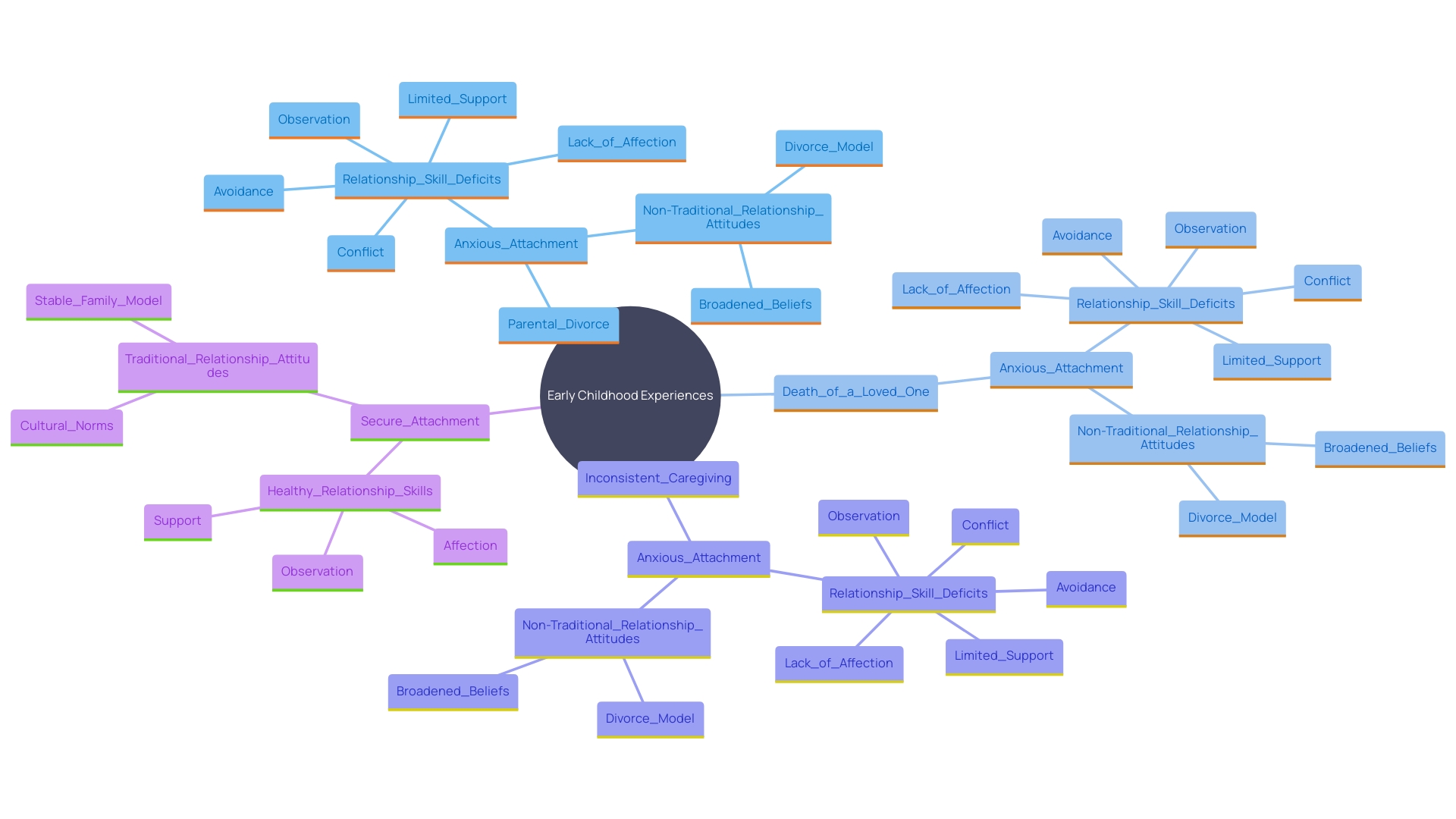
Symptoms of Fear of Abandonment
Symptoms of anxiety about abandonment can manifest in various ways, often leading to intense unease when separation seems imminent. Individuals may exhibit clinginess or an excessive need for reassurance in their relationships, fearing rejection or loss. This anxiety can also lead to emotional distress, panic attacks, or overwhelming sadness at the thought of loved ones departing. For instance, Damien, a 27-year-old medical trainee, experienced significant anxiety in social situations from a young age. Despite excelling academically, he struggled with panic symptoms during group presentations and interactions, illustrating the profound impact of fear of abandonment on daily functioning. Research also indicates that women who lost a parent early in life are more likely to experience separation anxiety and anxious attachment in romantic connections. This anxiety tends to peak during the initial years of a partnership and gradually declines over time. Fear of being left behind is not only associated with previous emotional mistreatment or loss but also with mental health issues such as borderline personality disorder and anxiety, profoundly impacting one's capacity to create and maintain healthy connections.
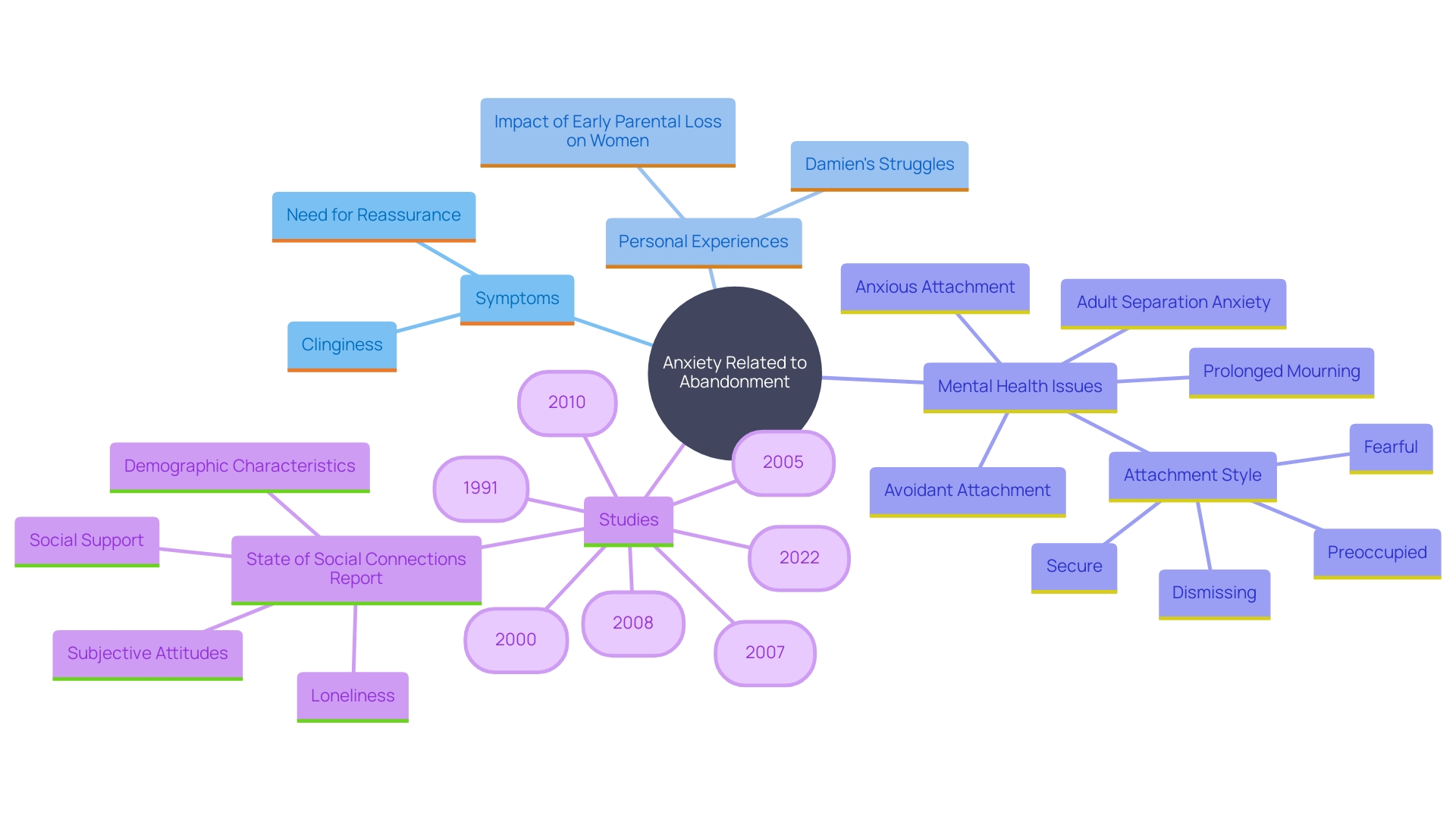
How Fear of Abandonment Affects Relationships
Fear of being left behind can greatly affect connections, often resulting in patterns of reliance and discord. Individuals may struggle with trust, become overly jealous, or exhibit controlling behaviors to prevent perceived dangers of being left behind. This can create a strain on connections, making it difficult for both partners to feel secure and fulfilled. For instance, those with an anxious attachment style, characterized by a fear of abandonment and an excessive need for closeness, may find it particularly challenging to maintain healthy connections. They may constantly seek reassurance from their partners, leading to feelings of suffocation and, eventually, resentment. Conversely, avoidant attachment involves discomfort with closeness and a preference for emotional distance, which can be equally damaging. These patterns often stem from early attachment experiences and are further complicated by trauma or past abusive interactions. Research has shown that women who lost a parent early in life are more likely to experience separation anxiety and anxious attachment in their adult connections. This heightened anxiety can peak in the initial years of a romantic connection, gradually declining over time but leaving lasting impacts. Navigating these dynamics requires understanding each partner's attachment style and working towards a secure functioning connection through supportive communication and mutual respect.
Long-term Effects of Fear of Abandonment
Unresolved fear of abandonment can lead to chronic emotional issues such as low self-esteem, depression, and difficulties in forming healthy attachments. This frequently leads to individuals being caught in a pattern of unstable connections or opting for solitude to prevent possible pain, resulting in loneliness and additional emotional turmoil. According to a study published in Stress and Health, women who lost a parent in their youth are more likely to experience separation anxiety and anxious attachment in adulthood. This increased anxiety can peak in the initial years of romantic connections and gradually decline over time. Individuals who have endured harmful partnerships frequently encounter comparable obstacles, where the anxiety of being left and emotional coercion maintain them in detrimental circumstances. For instance, a father who emotionally withdrew from his son saw the child's mental health deteriorate but felt unable to stop, fearing it would mean admitting his mistakes. Such patterns of behavior emphasize the complexity and deeply rooted nature of fears related to being left behind, making it essential to seek professional assistance to disrupt these cycles and foster healthier relationships.
Overcoming Fear of Abandonment
Conquering the anxiety of abandonment is a profound journey of self-exploration and emotional healing. It begins with recognizing the anxiety and comprehending its origins, often linked to previous experiences of rejection or loss. Many individuals struggle with rejection sensitivity, where the anticipation of being hurt or betrayed becomes so overwhelming that it leads them to push people away, even when they yearn for deep, meaningful connections.
One pivotal aspect of healing involves challenging and reframing the negative thought patterns and behaviors that reinforce this anxiety. For example, the anxiety of being alone or isolated can compel individuals to remain in unfulfilling relationships or steer clear of new opportunities. 'Acknowledging that these concerns, while powerful, are not insurmountable is crucial.'. By observing and understanding these fears, people can begin to dismantle them, much like realizing that the perceived threats in a supposedly haunted house are often just the creaks and groans of settling floorboards.
Building self-compassion is another integral part of this process. Studies have shown that self-compassion can significantly enhance satisfaction in connections, as it allows individuals to be more forgiving of their own shortcomings and those of their partners. This practice can be particularly transformative in couples' therapy, helping to create a more nurturing and supportive dynamic between partners.
Furthermore, nurturing positive connections necessitates a deliberate effort to transcend codependent behaviors, which frequently arise from a profound desire for validation and a tendency to evade conflict. As Melody Beattie, a renowned author on codependency, notes, codependents often prioritize others' needs over their own, leading to negative emotional consequences. By nurturing a harmonious bond where both partners feel appreciated and comprehended, people can establish a more stable and satisfying connection.
The concept of earned secure attachment also highlights the potential for healing and growth. Studies suggest that people who faced insecure connections in their early years can cultivate stable bonding patterns as adults through therapy, introspective efforts, and later secure connections. These experiences enable them to narrate their past coherently and reflectively, showcasing the human capacity for resilience and change.
Practicing self-kindness and grasping the dynamics of anxiety and attachment can enable people to conquer the apprehension of being left behind, resulting in more genuine and fulfilling connections.
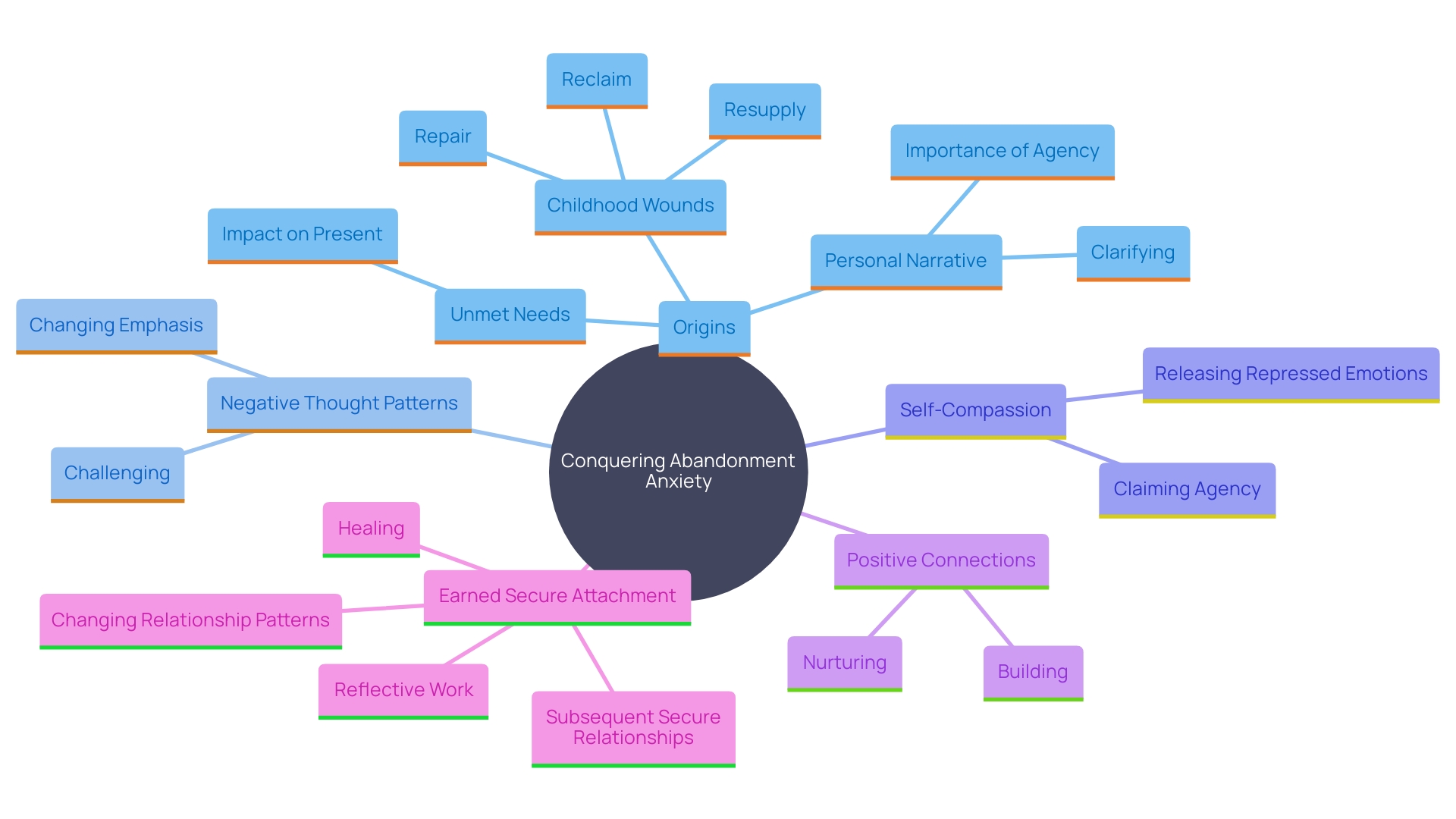
Strategies for Healing and Coping
Dealing with anxiety related to being left behind necessitates a comprehensive strategy that considers both emotional and psychological requirements. Mindfulness practices, such as meditation and deep breathing exercises, can assist people in staying grounded and present, reducing anxiety triggered by fears of abandonment. Engaging in therapy is crucial, as it provides a safe space to explore and express feelings. For example, Sierra, a young First Nations woman, found it difficult to trust mental health professionals due to her past experiences. However, her journey through therapy, supported by her wife, allowed her to confront her trauma, neglect, and abuse. This emphasizes the significance of a supportive therapeutic connection.
Developing strong support systems is another key strategy. Establishing relationships with compassionate and understanding people can foster a feeling of safety. Journaling is also beneficial, as it offers an outlet for processing emotions and reflecting on personal experiences. Additionally, learning skills to regulate emotions and communicate needs effectively can foster healthier relationships. Studies have shown that interventions like compassionate mind training (CMT) can significantly impact anxiety and depression, promoting emotional well-being.
Emotion regulation tools, such as distancing and reframing, can assist individuals in managing their responses to feelings of being left behind. Research indicates that these strategies improve emotional, social, and cognitive outcomes. Adopting these techniques can result in a stronger and more empowered strategy for addressing the anxiety of being left behind.
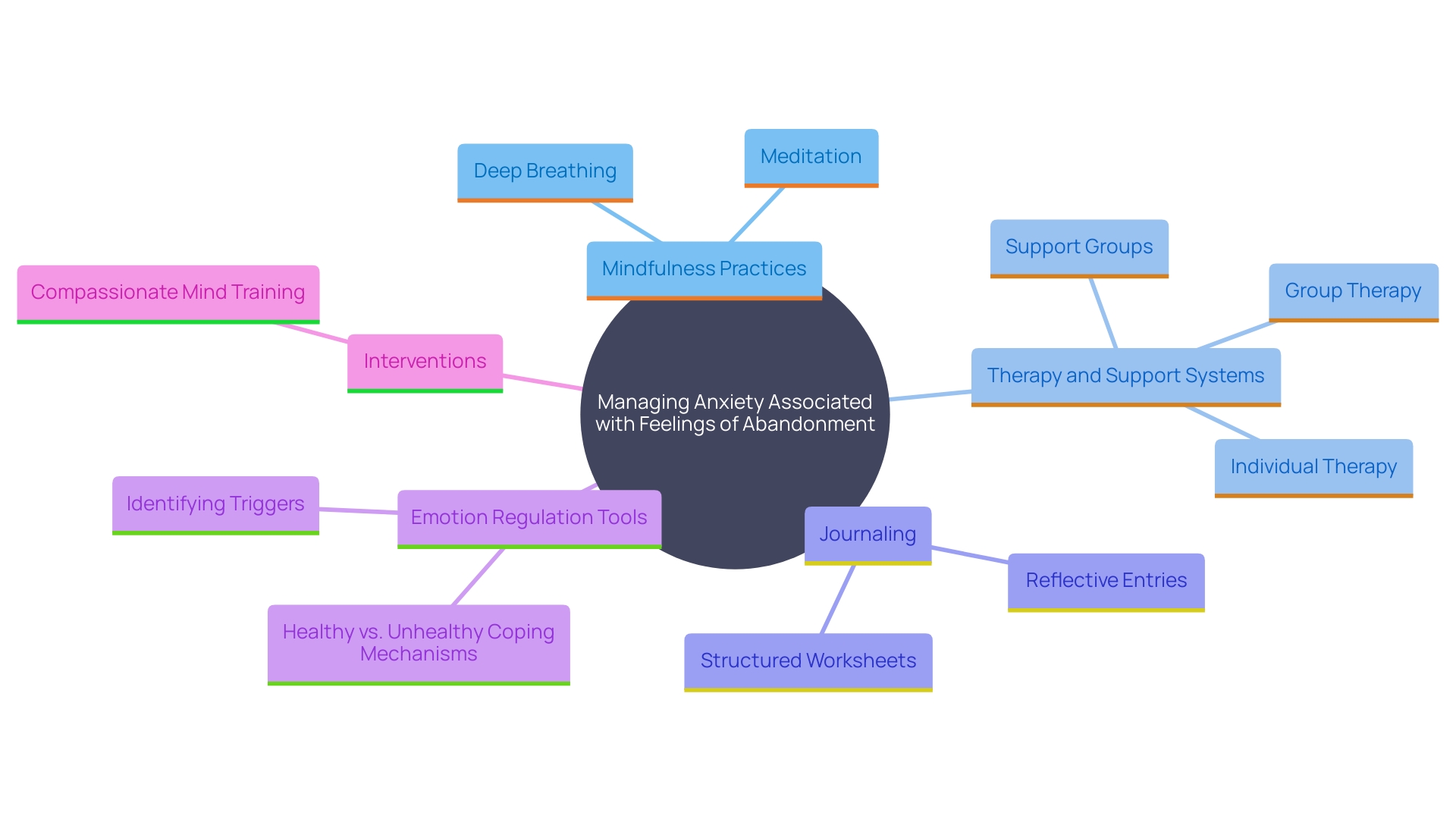
Seeking Professional Help
Seeking professional help can be transformative for those struggling with fear of abandonment. Engaging with a licensed therapist offers an opportunity to receive personalized guidance and support, critical for navigating intricate emotions and improving relational dynamics. Therapy offers a safe space where people can explore past traumas and strive to develop a stronger sense of self and healthier relationships.
The vision behind Counseling Unconditionally exemplifies the profound belief in the healing potential of genuine connection and understanding through professional treatment. This approach is echoed in the journey of many veterans, like those who transition from military service to becoming pillars of support for others battling internal conflicts.
Psychotherapy, or talk therapy, is a widely recognized and versatile treatment that has been shown to be effective in addressing a multitude of mental health issues. By speaking with a trained therapist in a confidential setting, people can explore and understand their feelings and behaviors, ultimately gaining valuable coping skills. This method is supported by research, which has found personal psychotherapy to significantly improve symptoms across various mental health conditions.
Furthermore, the significance of mental health awareness is emphasized by programs like Mental Health Awareness Month, urging people to take the first step in seeking assistance. This is particularly pertinent given the lasting psychological impacts of recent global crises and the notable increase in mental health issues among children and adolescents. Effective therapy can provide lasting benefits, helping individuals overcome challenges and lead fulfilling lives free from anxiety and self-doubt.
Conclusion
Understanding and addressing the fear of abandonment is vital for fostering healthier relationships and emotional well-being. This fear, often rooted in early experiences of loss or emotional neglect, can manifest in various ways, leading to anxiety, clinginess, and difficulties in trust. Recognizing its origins allows individuals to embark on a journey of self-discovery and healing, which is essential for breaking free from the cycles of dependency and conflict that often characterize these fears.
The long-term effects of unresolved abandonment fears can be debilitating, contributing to low self-esteem, depression, and unstable relationships. However, there is hope. Through strategies such as mindfulness, therapy, and building supportive networks, individuals can learn to cope with their emotions and cultivate healthier connections.
Developing self-compassion and understanding attachment dynamics play crucial roles in this healing process, allowing for more authentic and fulfilling relationships.
Seeking professional help is a pivotal step in overcoming the fear of abandonment. Engaging in therapy provides a safe space to explore past traumas and develop effective coping mechanisms. The journey may be challenging, but with the right support and strategies, individuals can transform their experiences, leading to a more secure sense of self and enriched relational dynamics.
Embracing this path not only fosters personal growth but also paves the way for deeper connections with others, ultimately enhancing overall quality of life.




